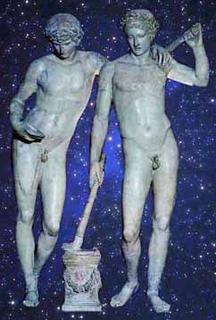Ante Diem VIII Kalendas November

Modern Date : October 25th
Ante Diem VIII Kalendas November
Eighth Day to the Kalends of November
This is one of the dies comitiales when committees of citizens could vote on political or criminal matters.
October was the eighth month of the old Roman calendar and was sacred to the goddess Astraea, daughter of Zeus and Themis. The name October comes from Octo, meaning eight (March used to be the first month).
Jupiter enters Scorpio
In the most important planetary transition of this season, Jupiter enters Scorpio. He will remain in this sign until late 2006. This placement is neither bubbly nor disastrous, but it's hardly one of Jupiter's favorites, as his mirth and enthusiasm are now in the sign of the gloomy Lord of Death, making the King of the Sky a kind of swinger trapped for a year in a mortuary, and having to act more compulsively happy than he actually feels. This is why Jupiter in Scorpio is so often interpreted as hedonism, bloat, satyriasis, overestimation of self, shopping to exhaustion and other streams of overindulgence.
Day of the Dioscuri
The Greeks called this the Day of the Dioscuri. The twin brothers Castor and Pollux were called the Dioscuri by the Greeks and the Gemini by the Romans. Pollux was a god but Castor was mortal. They were the sons of Zeus and Leda. Castor was reknowned for his skill with horses while Pollux was a famed boxer. The Dioscuri were worshipped as the protectors of travellers. They were especially honored by the Spartans, who carried their images into battle. The day of the Dioscuri was surmounted by the Catholic chruch by the feast day of Saints Crispin & Crispinian.
"The twenty-fifth of October
Cursed be the cobbler
Who goes to bed sober."
Saints Crispin & Crispinian
Unreliable legend had Crispin and Crispinian, noble Roman brothers who with St. Quintinus, went to Gaul to preach the gospel and settled at Soissons. They were most successful in convert work during the day and worked as shoemakers at night. By order of Emperor Maximian, who was visiting in Gaul, they were haled before Rictiovarus (whose position is unknown and even his existence is doubted by scholars), a hater of Christians, who subjected them to torture; when unsuccessful in trying to kill them, he committed suicide whereupon Maximian had the two brothers beheaded. They are the patrons of shoemakers, cobblers, and leatherworkers.
Sh'mini Atzeret
The Jewish festival which closes off the seven days of Sukkoth, celebrated during the waning moon. Arthur Waskow (Seasons of Our Joy)describes it as Seed for Winter. At this pivotal point, both lunar calendar and solar calendar are aligned in the waning phase. Waskow sees it as marking the time for turning inward. Atzeret means putting a boundary, restraining, collecting. This is the first day when a prayer is said for rain. The rationale is that one does not want rain during the nights of sleeping in the sukkah. Also separating the water pouring of Sukkot from the explicit prayer, makes it seem less like an act of sympathetic magic.
The climactic prayer of the evening service:
"For You are the Lord our God, who makes the wind blow and the rain fall!--for blessing and not for disaster; for life and not for death; for plenty and not for famine."
For this is a time of looking forward to the winter, a time of death and stillness. The God who revives the dead is invoked in the same prayer as the God who brings the rain. Waskow says this is because it is rain that revives the seeds that are buried underground, mingling the same energy found in the Thesmophoria of fecundity and death.
Feast of the Holy Souls
The beginning of the 13-day Feast of the Dead for the Tzeltals of Mexico. Graves are decorated with pine needles and tusus (yellow wild flowers).

0 Comments:
Post a Comment
<< Home